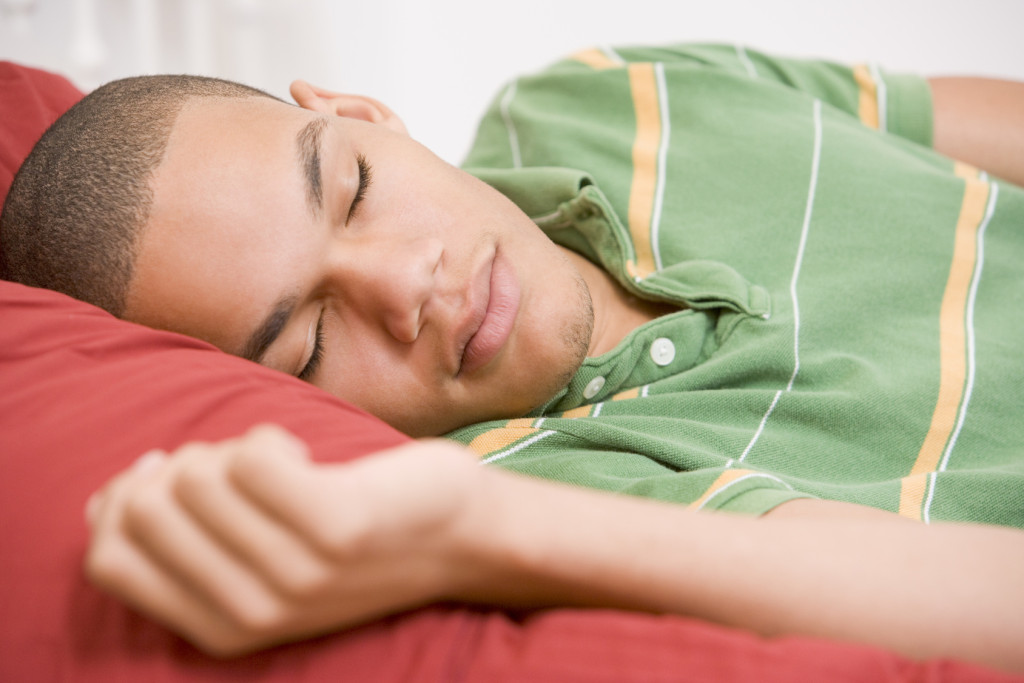- Teens need an average of about 9 hours of sleep every night.
- Be consistent with when you go to bed and wake up.
- Limit the amount of caffeinated beverages you drink, especially before bed time.

Between homework, sports, other activities, and having a social life, many teens don’t get enough sleep. Sleep is very important and can affect your health.
Why is sleep important?
Your body, including your brain, works best when you get enough sleep. You’re probably aware that you feel tired and rundown when you don’t get enough sleep. But lack of sleep also makes it harder to concentrate or perform well while at school or doing homework, or when participating in sports or other activities. Not getting enough sleep worsens your mood and also slows down your reaction time and affects your ability to concentrate while driving.
What causes sleep problems?
Sleep problems can be caused by an irregular schedule, stress, (having lots of things on your mind), changes in your sleep environment (your bedroom is too hot, too cold, or too noisy), and by consuming stimulants such as caffeine too close to bedtime. Sometimes the cause is unknown. Exposure to electronic screens (phone, TV, computer) can also cause sleep problems.
Research has shown that many teens don’t get enough sleep. This is partly due to the fact that during adolescence, teens’ “circadian rhythm” (the body’s internal clock) has a tendency to shift out of sync with the external clock. Instead of releasing melatonin (a hormone) early in the evening, the brain does so much later at night which makes it harder both to fall asleep early (enough to get a full 9 hours of sleep), and to wake up on time the next morning.
How much sleep do I need each night?
According to research studies, teens need about 8-10 hours of sleep each night. Younger children need more sleep (9-12 hours a night) and adults need slightly less (7 or more hours each night).
10 Tips to Follow:
- Wake up at the same time every day (or within 1 hour of your usual wake up time) EVEN on the weekends. A regular wake up time promotes sleep hygiene and prevents sleep problems.
- No caffeine after 3pm: Avoid beverages with caffeine (soda, coffee, tea, energy drinks, etc.) especially after 3pm.
- Space out your meals:
- Have a nightly routine before bed: Plan on “winding down” before you go to sleep. Begin relaxing about 1 hour before you go to bed. Try doing a quiet activity such as listening to calming music, reading a book or meditating.
- Turn off the TV and ALL electronics including video games, tablets, laptops, etc., 1 hour before sleep, and keep them out of the bedroom.
- Turn off your cell phone and all notifications (new email and text alerts) using a feature like “do not disturb” or even better, leave your phone outside your room while you sleep. Studies have shown that a part of your brain continues to respond to certain lights and sounds even while you’re sleeping.
- Make your bedroom quiet, dark and cool. If you can’t control the noise, try wearing earplugs or using a fan to block out other sounds.
- Practice relaxation techniques. Try reading a book or meditating or write a list of what you need to do the next day so you don’t have stress about remembering.
- Don’t smoke, or quit if you do. Nicotine, alcohol, and marijuana can all keep you awake. Talk to your health care provider if you need help with substance use.
- Reduce exposure to bright light in the last three hours of the day before going to sleep.
 Young Men's Health
Young Men's Health
